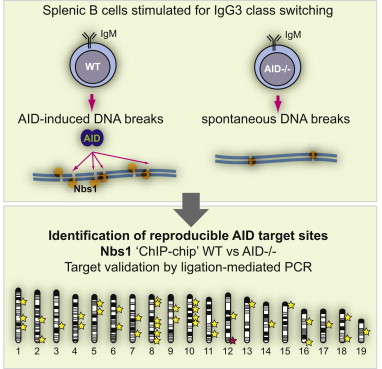
“Class switching” is a biological process that creates diversity in the immune system by creating new and slightly different antibodies to improve the immune system’s response to infections. One way that class switching is triggered is by breaking up DNA in the genes of antibodies. A new study shows an enzyme crucial in this process that improves the immune response also causes breaks in the DNA elsewhere, perhaps promoting the production of cancer-causing oncogenes.
In “Activation-Induced Cytidine Deaminase Induces Reproducible DNA Breaks at Many Non-Ig Loci in Activated B Cells,” appearing in the January issue of the journal Molecular Cell, Janet Stavnezer, PhD, professor of microbiology and physiological systems, and colleagues, describe how one enzyme that promotes class switching—good for the immune response—also causes hundreds of DNA breaks throughout a gene—bad for keeping cancer-causing oncogenes in check. The culprit is an enzyme called AID, activation-induced cytidine deaminase.
“This paper by Dr. Stavnezer and colleagues shows that AID, which instigates DNA breaks essential for increasing antibody diversity, can also induce DNA breaks throughout the genome,” said Allan Jacobson, PhD, chair and professor of microbiology and physiological systems. “The research shows that some of these breaks were shown to occur close to, or within, mouse DNA regions that are known to be activated in B cell lymphomas or leukemias.” Because these regions of mouse DNA have similar characteristics to human oncogenes, “it’s very possible that AID may play an important role in the initiation of some human lymphomas and leukemias. Importantly, the paper also explores why specific genomic sites have AID-induced DNA breaks.”